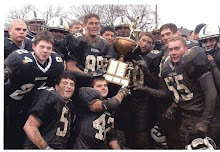Monday, December 14, 2009
Final Post- Reflection
Wednesday, December 2, 2009
Prompt #4
As Carlson would say, the voices that students express are a part of what they consider to be normal. If in fact the ideas differ with another student, then students “label” the other as “OTHER” or “abnormal”. The communities that they form based on their shared ideals dictates how a teacher responds to the situation at hand. How would my personal history, and thus my bias, intersect with those of my students? I think that I better equipped to handle situations of language barriers because I can speak Spanish pretty fluently. Knowing that with the growing Hispanic population in America, I thought that it would be a good idea in high school to take Spanish so I would be 1) more marketable to colleges, 2) converse with Spanish-speaking friends and not have terrible language barrier problems, and 3) because I knew that I wanted to be a teacher. And I knew that teachers needed to be able to help students whose first language isn’t English.
There are challenges that as a teacher I will face when it comes to dealing with my personal biases and my classroom. At some points, I will have to control my biases towards certain students because of their race or language because I’m here to teach them. Putting aside my biases would mean making myself more open to new things, then be able to use this newfound knowledge from my students in the classroom. My biases might hinder my ability to reach ALL students simply because of our differences in opinion, but it is imperative that I reach ALL because it will better their lives. Including everyone in the classroom is necessary for a bias-free society as Johnson points out. He tells us that in order for change, we have to begin to think about our place in the world NOW and how are biases and beliefs shape the way in which we participate in it.
Saturday, November 28, 2009
Prompt #3
The Brown School has turned out to be a very good school. I have enjoyed going there twice a week and observing the students and helping Mrs. Flower. Recently, I noticed that the teacher assesses how well students perform by how much they are paying attention. I’ve also noticed that those students who don’t pay a lot of attention to the lessons tend to ask a lot of questions about the lesson. I’ve experienced this and ask the students if they were paying attention. If they say they were, I would generally ask them base questions about the lesson. Students that tell me they weren’t really paying attention is really frustrating. It seems that some of these kids are sent to school to be babysat, and that’s disturbing. Some of the kids in the classroom are very disruptive, and they are typically the students that don’t pay attention. While there are many students in the class that DO pay attention, sometimes its understandable that they have questions. How exactly do you assess a student’s progress when you see them pay attention to the lesson, work on the assignment given, and yet, still struggle to understand the task? Is it easier for the teacher to respond to the linguistic, ethnic, and sociocultural characteristics of the students? Regardless of the cultural diversity in the school/classroom, political agencies still enter, according to Shor. He would argue that what’s taught in these culturally diverse classrooms depends on the socio-economic aspects of the region. Shor would also argue that mass education of students has become infamous for its increasing number of low motivated students. It seems that these days, teachers are “teaching to the test” and not making sure that students fully understand the material. Assessing students is almost impossible unless the teacher instills a sense of competition in his/her classroom. Now, using this logic, can students be assessed in their native language, if its not English? Goldenberg points out that a lot of research points to literacy and other skills and knowledge transfers across languages. Also, using this “transfer of information” is it possible for students to use other modes for which to understand and learn different material? Students are capable of using technology and language in order to learn.
Sunday, October 25, 2009
Prompt #2
According to Infoworks, 61% of the school is Hispanic, 23% White, 13% African American and 3% Asian. To me, this is a very diverse school because of the almost overwhelming Hispanic culture, whereas the next closest group is Whites. Even more astounding to me is that 88% of the students do not recieve some form of ESL learning, which means that most of the students don't need assistance. also, this school is slightly above the state average in Math, Reading and Writing. In Writing, this school is 20 points above the state average, which is really good. I'm pretty sure that there is an embodied cultural capital in this school, because it would seem that the students are well aware of the socialization in the schools. The classroom is set up in groups of 4 students, where each group is diversified, and the students work well together, because they see the need to work together. Mrs. Flower's class is diverse because there is a large majority of Hispanic students, as well as African American students. The class only consists of maybe 4 white students and 2-3 Asian students.
